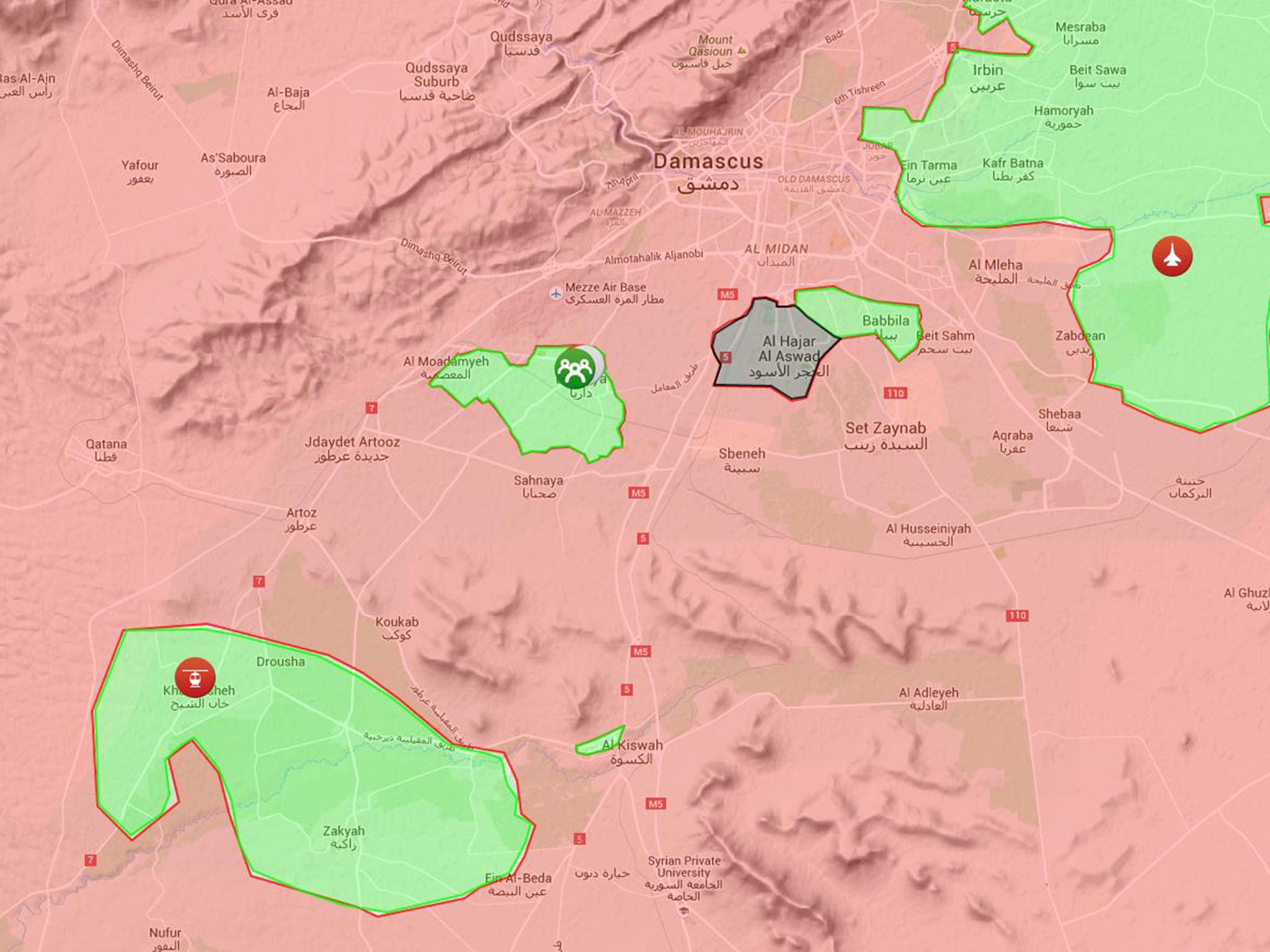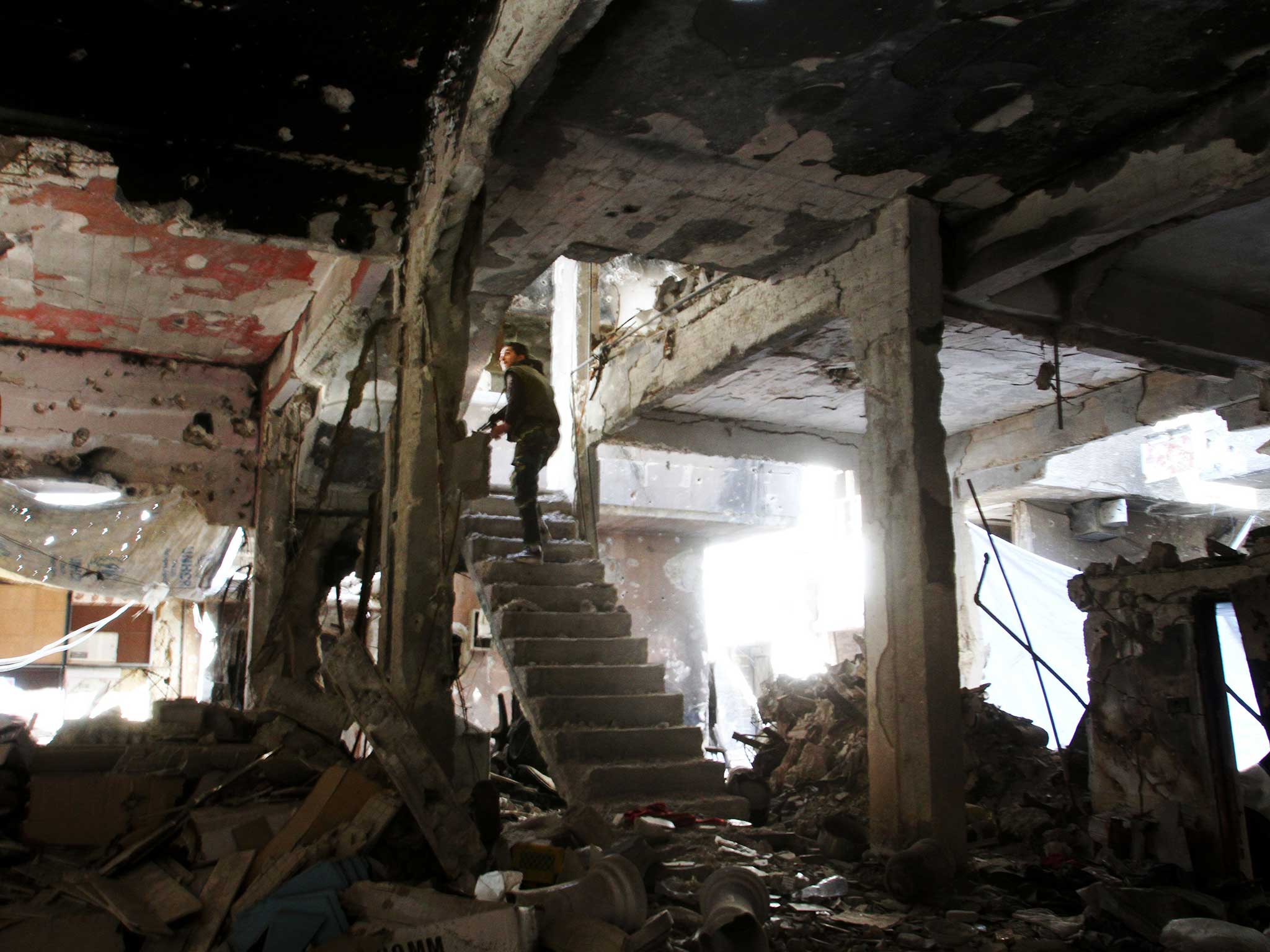Thousands of children trapped in Palestinian refugee camp bombed by Syrian government
Footage appears to show Khan Eshieh being hit by waves of barrel bombing in recent days
Your support helps us to tell the story
From reproductive rights to climate change to Big Tech, The Independent is on the ground when the story is developing. Whether it's investigating the financials of Elon Musk's pro-Trump PAC or producing our latest documentary, 'The A Word', which shines a light on the American women fighting for reproductive rights, we know how important it is to parse out the facts from the messaging.
At such a critical moment in US history, we need reporters on the ground. Your donation allows us to keep sending journalists to speak to both sides of the story.
The Independent is trusted by Americans across the entire political spectrum. And unlike many other quality news outlets, we choose not to lock Americans out of our reporting and analysis with paywalls. We believe quality journalism should be available to everyone, paid for by those who can afford it.
Your support makes all the difference.Around 3,000 children are among civilians facing a mounting humanitarian crisis in a town besieged by Syrian regime forces near Damascus.
Save the Children said the rebel-controlled Khan Eshieh area had been completely surrounded in recent days, with the last remaining road in and out closed by heavy shelling and snipers.
It houses a large Palestinian refugee camp, where a local aid group said three young men were shot dead while trying to escape in recent days as barrel bombs rain down on the settlement and surrounding farms.
Sonia Khush, head of Save the Children’s Syria programme, said: “Despite the supposed ceasefire across the country, people are living in terror of siege and bombardment.

“People in Khan Eshieh tell us that most medicine, fuel and flour has almost run out, and food prices have doubled in the past few days.
“They expect it to get even worse in the coming days. The roads and access to the camp must urgently be reopened and vital humanitarian aid immediately allowed in.”
The last road to the nearby town of Zakia, known locally as “the Death Road” due to the high risk of travelling on it, had been used to get food, medicine and supplies.
The Jafra Foundation, which provides education, support and aid in the camp, said basic supplies were dwindling and the situation was expected to worsen.
An opposition group published footage of explosions on Thursday, appearing to show a helicopter flying over before the sound of explosions were heard and huge mushroom clouds rose into the sky.
A Facebook page claiming to represent the local council has documented weeks of intensified barrel bombings and shelling blamed on the Bashar al-Assad’s regime in Khan Eshieh.
It said five helicopters unloaded more than 20 bombs on Thursday as well as “sporadic bombardment” with mortars and heavy artillery. Casualty figures were not immediately available.
Khan Eshieh became home to more than 20,000 Palestinians since they arrived in the 1940s, going on to settle and work as teachers, civil servants and on surrounding farms.
Since coming under the control of opposition groups in the Syrian civil war it has seen sporadic fighting and bombardment, leaving civilians and United Nations staff among the dead.
After almost three years under partial siege the number of inhabitants has fallen to around 12,000 people – a quarter of them children – Save the Children said.
All main roads between the camp and Damascus have been closed since 2013 and military checkpoints have been installed to prevent people from entering and leaving.

Only one doctor and one dentist are believed to remain in the camp, and do not have enough medicine, equipment and electricity needed to treat patients, while residents report an urgent need for water purification tablets to reduce the growing risk of disease.
The UN agency for Palestinian refugees (UNRWA) condemned attacks that killed at least one refugee and injured children in Khan Eshieh in June last year, as well as the killing of six Palestinians by mortar shells that hit a school in 2013.
Chris Gunness, a spokesperson for the agency, said it was concerned about the plight of more than 20,000 civilians in Khan Eshieh and Palestinian areas of Daraa governorate.
“In both areas, refugees have been exposed to direct armed conflict, violence and humanitarian deprivation and we need immediate and sustained humanitarian access,” he added.
“In Khan Eshieh we estimate that there are about 5,000 civilians and in the inaccessible areas of Dera’a governorate we estimate there are about 17,500 people, including many thousands of children.”
Despite the “cessation of hostilities” agreed in February and accompanying pledge by the Syrian regime and rebel groups to allow humanitarian access into besieged areas, Khan Eshieh is one of many cut off and under attack.
Only 17 per cent of the more than 4.5 million people in surrounded and hard-to-reach areas have so far received assistance, Save the Children said, and UN aid convoys continue to be denied permission. At least six besieged areas have still not received any aid at all.
One convoy was refused entry to Daraya on Thursday,despite having obtained prior clearance from all sides that it could proceed.
The International Rescue Committee said the situation was “desperate” after three-and-a-half years of fighting and that the convoy, due to be the town’s first ever aid delivery, was taking baby milk, vaccinations and medical supplies.
There is also concern about the situation in another Palestinian refugee camp – Yarmouk in Damascus – which has been overrun by Isis in weeks of fighting, leaving families without access to food, clean water and medical treatment.

Join our commenting forum
Join thought-provoking conversations, follow other Independent readers and see their replies
Comments